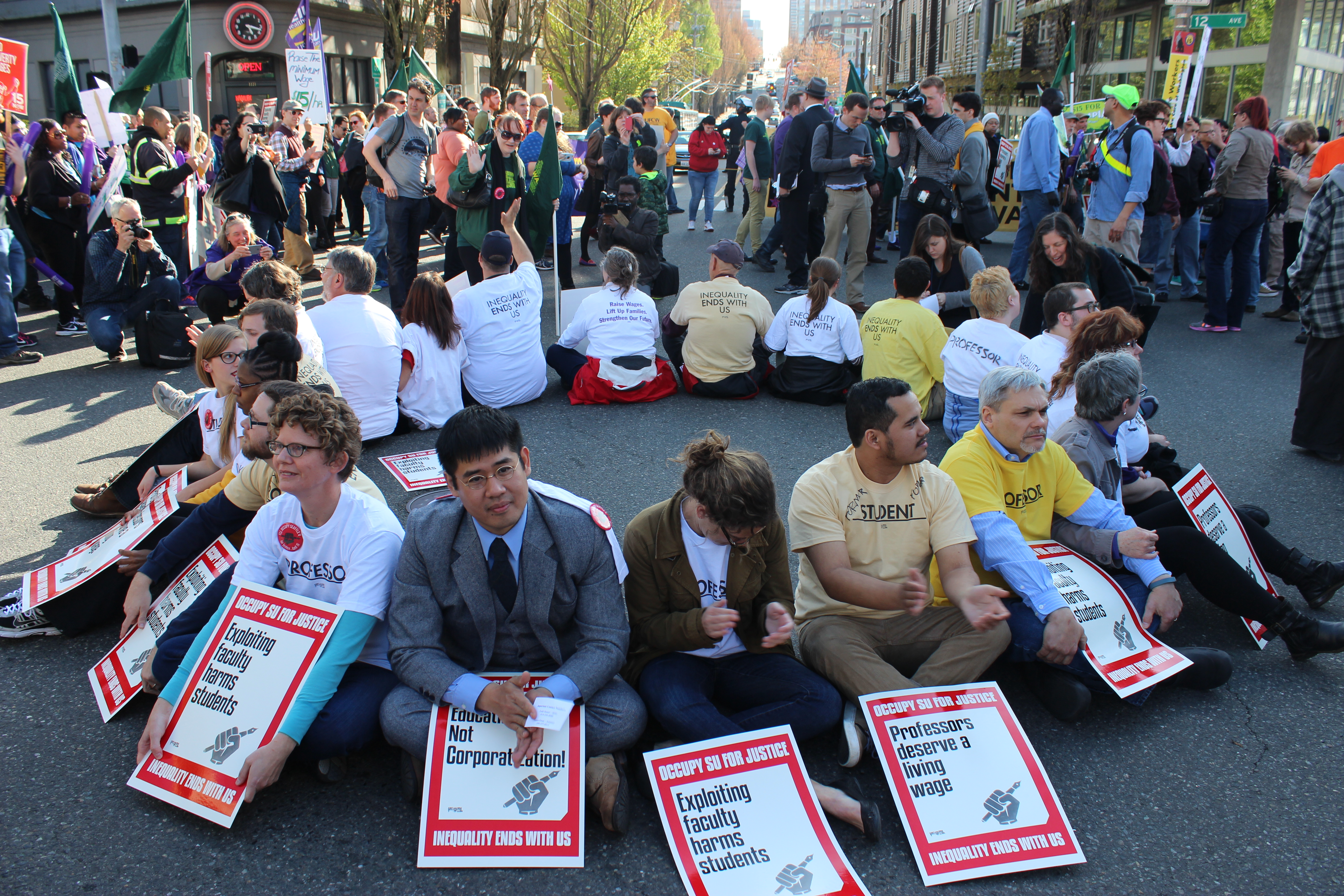Photo by Casey Jaywork
Yesterday, hundreds of labor activists—along with Seattle City Councilmembers Mike O’Brien and Kshama Sawant—marched through Seattle’s streets calling for a nationwide $15 minimum wage and stronger protections for workers. Starting at Occidental Park, the march wound through Westlake and Cal Anderson Parks, stopped at Seattle University for a couple speeches, and ended with several consensual arrests at the intersection of 12th and Madison.
The afternoon march and rally was one of a series of action that took place across the country on Tax Day, all with the goal of instituting minimum wage laws like (or better than) the one passed in Seattle last year in other major metropolitan areas. But there was more to the local protests than just the minimum wage.
Seattle University vs. Non-tenured FacultyOne of the marchers’ main targets for the day was Seattle University. Since at least the beginning of 2014, the private Jesuit school’s non-tenured faculty have been agitating for a union to allow them to collectively bargain with the University. They’re not asking for much, says SU political science professor Larry Cushnie—merely “to have some knowledge outside of quarter-to-quarter to know how long our contracts are going to be, to have an opportunity to have basic things like office space [and] the ability to talk to students privately.”
But SU has been fighting to keep that union from forming, using a collection of legal arguments ranging from claims that they’re not governed by regular labor law because of their religious status to insistence that the size of the proposed union is the problem. Sometimes the school has claimed it’s too big, at other times too small.
The National Labor Relations Board unambiguously ruled in favor of the organizing faculty last April, and the following month the non-tenured faculty voted on whether to unionize. But Cushnie says that those votes have “been impounded because the university continues to appeal and appeal and appeal.”
One of Cushnie’s colleagues, sociology PhD Julie Harms Cannon, was later among 21 protesters who were arrested by Seattle police after blocking the Capitol Hill intersection. She echoes Cushnie’s sentiments: “[Seattle University has] appealed at every turn. They’ll give any reason possible not to let us [unionize], despite their mission, which is a very strong Jesuit mission, that fights for justice and equality.”
Councilmember Sawant rallies the troops. Photo by Casey Jaywork
Soaring RhetoricBefore the arrests, though, the marchers packed into SU’s Pigott Building, three stories of open space that served as an auditorium for a series of speeches. Students and faculty spoke emotionally of their own experiences, and councilmember Mike O’Brien recalled to the crowd how he’d walked with fast food protesters in 2013. But while O’Brien’s call to expand a $15 minimum wage across the country roused the assembled marchers, it was socialist city councilmember Kshama Sawant who fairly electrified the crowd with her customary brand of soaring, revolutionary rhetoric. A truncated version of her speech:“We [the workers]…rallied and protested and dragged the political establishment, kicking and screaming, to concede a fifteen dollar minimum wage. In just a half year last year, we moved from zero city councilmembers supporting fifteen, to all nine.“And I can guarantee you that, other than exceptions like councilmember Mike O’Brien and Nick Licata, this did not happen because the government suddenly decided to care about workers.“We made it happen.“We left them with no choice. They could either support us, or be swept aside into the dustbin of history. And, my sisters and brothers, that is how it is going to be, if we are going to fight for housing justice and if we are going to win rent control in this city…“We know that what we won in Seattle through 15 is not enough. Big business and their political representatives filled the minimum wage with as many loopholes as they could get away with. But we have learned from our struggle that if we organize and we fight back, we can win.”
cjaywork@seattleweekly.com








